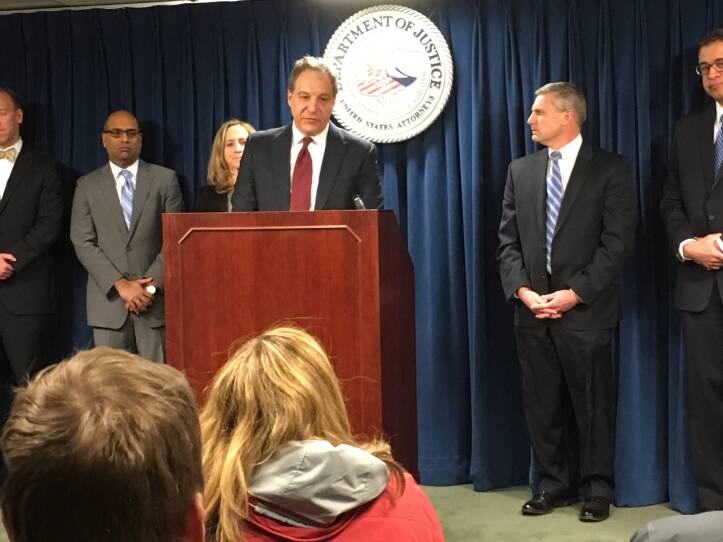The jury has reached a verdict in the trial of former pharmacist Barry Cadden. He’s been acquitted of causing the deaths of 25 people in a meningitis outbreak but convicted of racketeering. He was also found not guilty of defrauding the federal government.
As the verdict was read, Cadden sat looking straight ahead and showed almost no emotion. His sentencing was set for June 21. Cadden will remain free on bail until then.
Cadden was the president and head pharmacist at the New England Compounding Center (NECC). Contaminated drugs made at his now-defunct Framingham pharmacy caused the 2012 meningitis outbreak. It was largest meningitis outbreak in US history, sickening more than 700 people and killing at least 64 of them.
During more than nine weeks of testimony, both sides agreed on one thing: People died as a result of steroid injections made at Barry Cadden’s compounding pharmacy. Those injections had been contaminated with mold.
From there, the two sides told vastly different stories.
Federal prosecutors argued that Cadden was a man driven by greed. He knew his drugs could kill people, and he still shipped them out.
Prosecutors had two big allegations. First, that Cadden’s pharmacy was filthy – teaming with mold and insects. And under his direction, employees used expired ingredients and improperly tested drugs.
Second, prosecutors said Cadden’s outfit skirted regulations to avoid federal oversight. NECC fabricated prescriptions to look like a retail pharmacy and not what they really were: a drug manufacturer. That way they fell under state regulations and not under federal authorities.
Cadden’s defense attorneys countered that it was the pharmacy’s employees and contractors that ignored safety regulations and wrote fake prescriptions. And, as soon as Cadden saw a problem, he worked “aggressively and appropriately” to fix it.
Federal prosecutors charged Cadden with 96 criminal counts, including fraud and racketeering. Under the racketeering charge, prosecutors listed 25 counts of second-degree murder.
The government did not seek to prove Cadden intended to murder the patients with his drugs. Instead, they argued that he’d demonstrated an extreme indifference to human life.

However, Cadden’s defense attorneys argued that proving intent was necessary and that Cadden didn't intend to harm anyone. They said that as soon as Cadden found a problem caused by his employees or contractors, he worked tried to fix it.
On the second-degree murder charges, jurors ended up siding with the defense because they did not hold him directly responsible for the deaths.
Federal prosecutors also argued that Cadden tried to avoid regulators through a complex scheme involving fake prescriptions. He wanted to make it look like his compounding pharmacy was filling individual prescriptions, prosecutors alleged. That way, they would be overseen by state regulators, whom Cadden knew to be overburdened.
The reality, prosecutors said, is that Cadden was producing bulk medication and should have been classified as a drug manufacture. Cadden tried to avoid that, they argued, because it would have meant more federal oversight.
According to the federal prosecutors, this amounted to defrauding the U.S. Food and Drug Administration.
However, Cadden’s defense attorneys argued that it was employees and customers who faked the prescriptions. Plus, they said it was an incredibly murky regulatory landscape and that even the former FDA didn’t think the law was clear on which body had authority over who.
The Associated Press contributed to this report.





